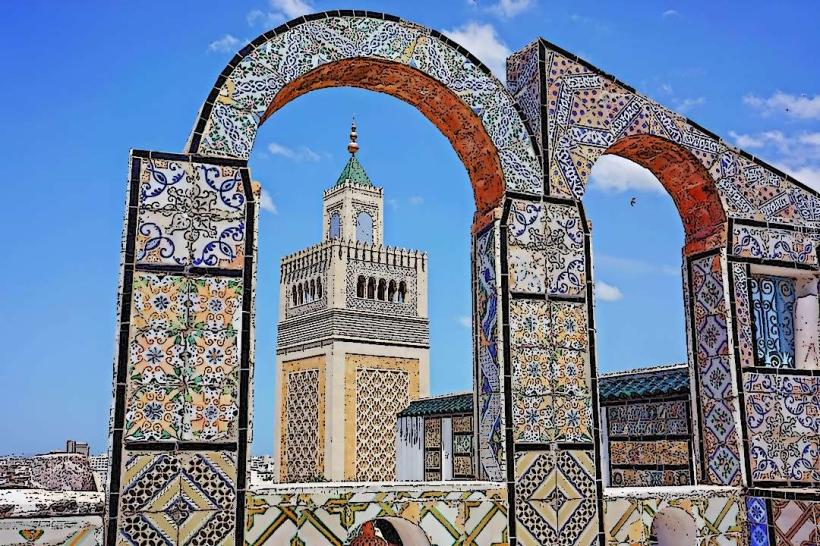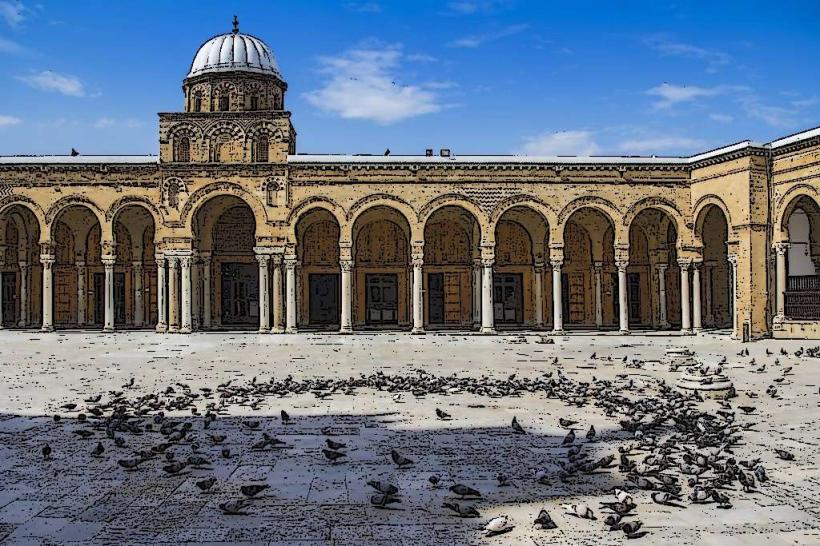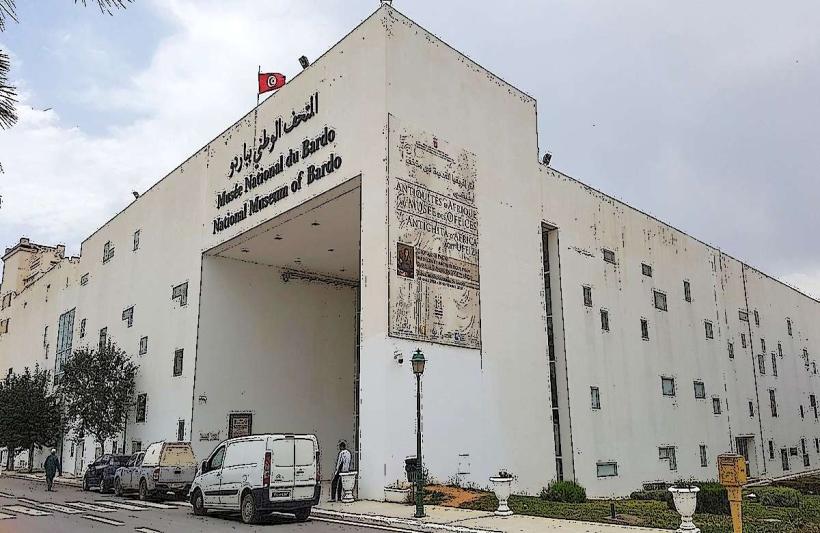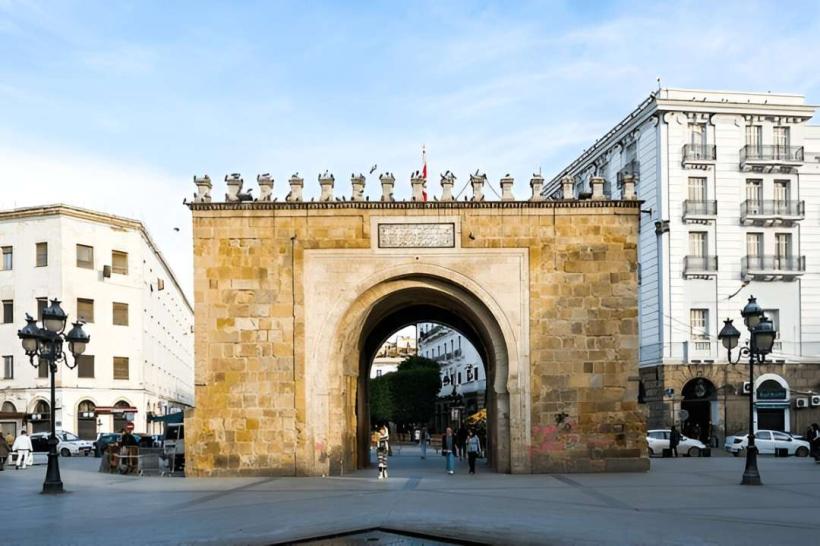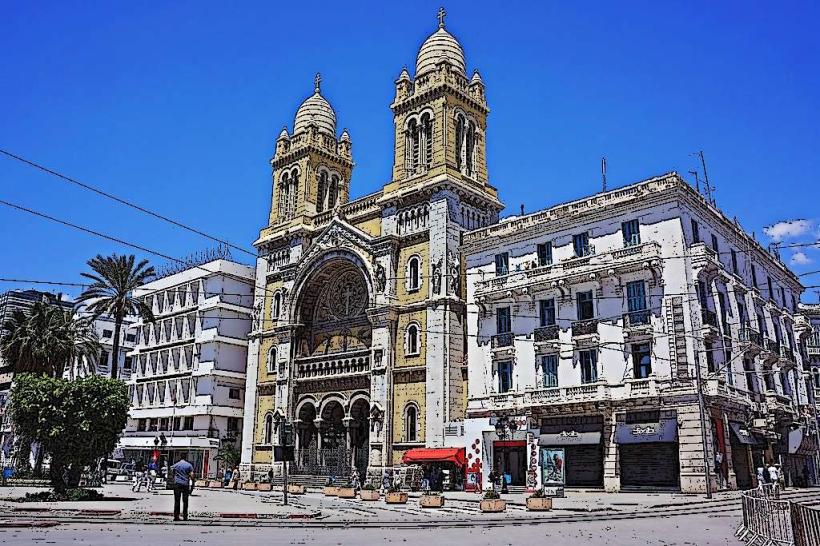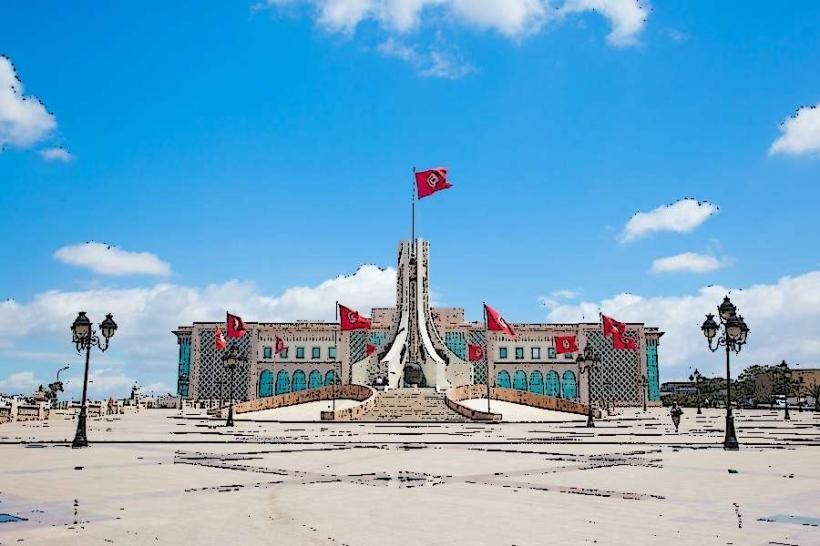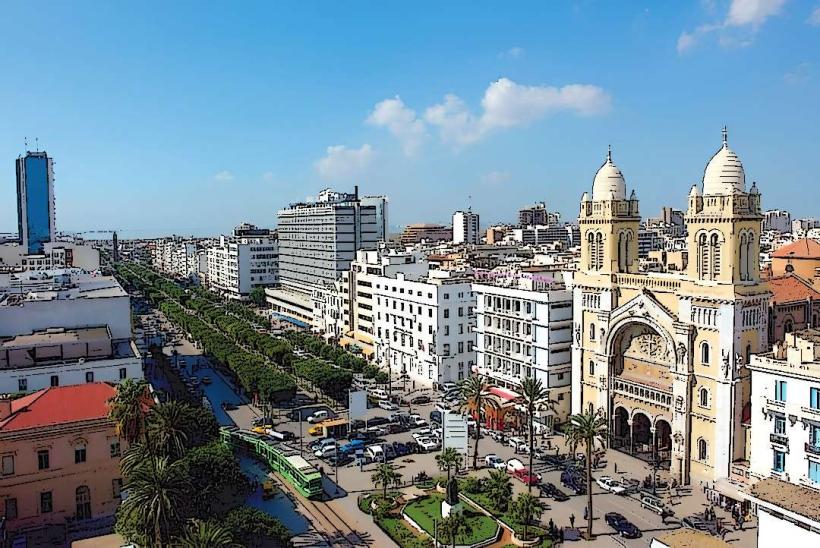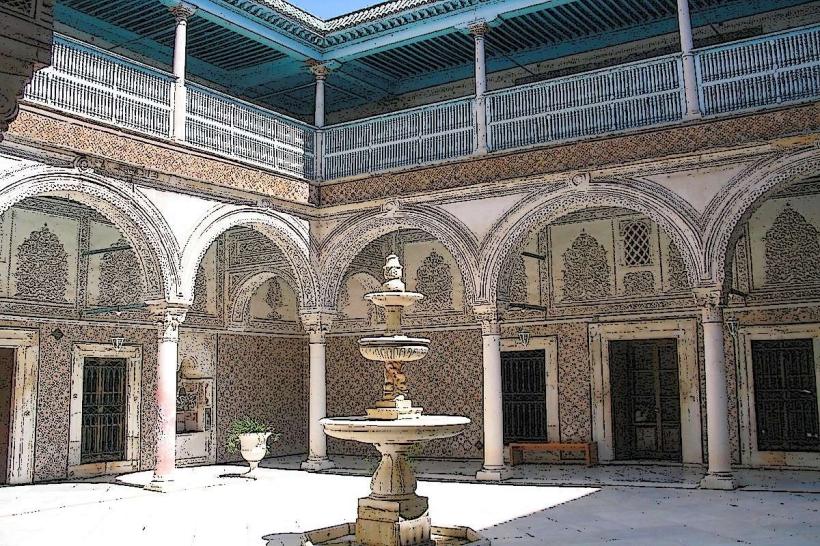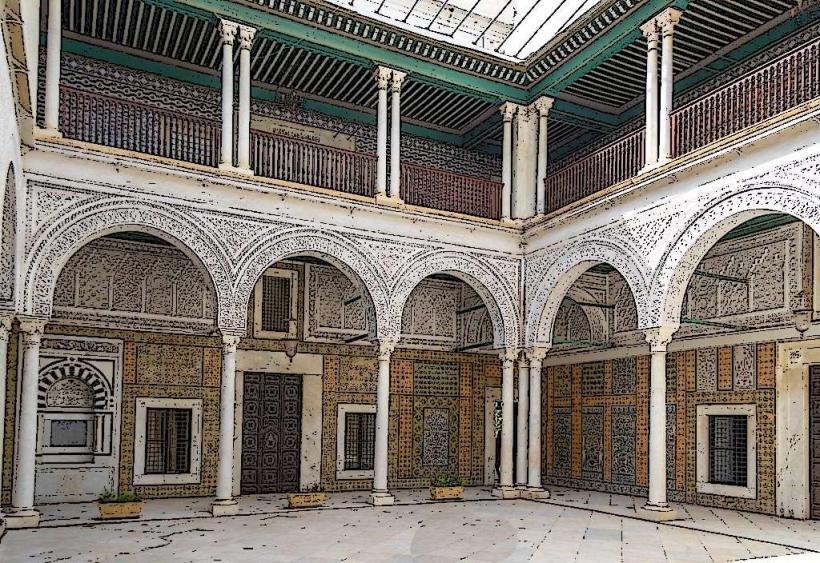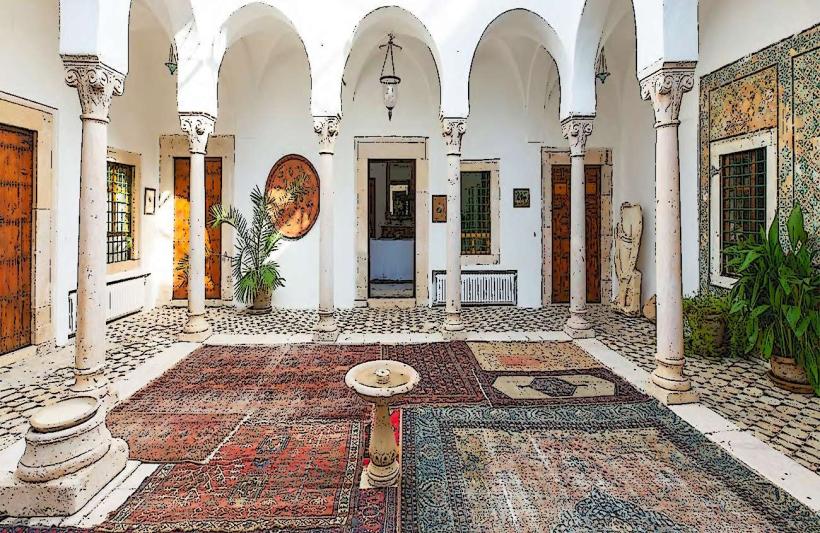Information
City: TunisCountry: Tunisia
Continent: Africa
Tunis, Tunisia, Africa
Tunis is the capital and largest city of Tunisia, located in the northernmost part of the country, along the Mediterranean coast. It is situated near the Lake of Tunis and the Carthage Peninsula, approximately 160 kilometers (99 miles) east of Algiers and 1,300 kilometers (810 miles) south of Rome. As the political, cultural, and economic center of Tunisia, Tunis plays a vital role in shaping the country’s identity and development.
Geography and Climate
Tunis enjoys a Mediterranean climate, characterized by mild, wet winters and hot, dry summers. The average summer temperatures can reach up to 30°C (86°F), while in winter, temperatures typically range between 10°C (50°F) and 15°C (59°F). Rainfall is most common between October and March, but overall, the city experiences relatively low annual rainfall, around 400-600 mm (16-24 inches). The city's coastal location also makes it vulnerable to rising sea levels, but its geographic position, nestled between the lake and the Mediterranean Sea, provides a unique balance of both urban and natural landscapes.
History
Tunis has a rich and varied history, dating back more than 2,500 years. It has been home to several important civilizations, including the Phoenicians, Romans, Arabs, and French.
Phoenician and Carthaginian Era: Tunis was originally a Phoenician settlement, and its close proximity to the ancient city of Carthage gives it historical significance. Carthage was once a major power in the Mediterranean, famously involved in the Punic Wars with Rome. Though Carthage was destroyed by the Romans in 146 BC, the area of modern-day Tunis continued to be significant in the Roman Empire as a center of trade and administration.
Arab Influence: After the Arab conquest of North Africa in the 7th century, Tunis became a prominent center for Islamic culture and trade. The city’s name is believed to be derived from the Arabic word "Tunis," meaning "to camp" or "to settle." The Aghlabid dynasty (9th century) helped establish the city's prominence, particularly with the construction of mosques, public baths, and the development of a strong economy based on trade.
Ottoman Rule: In the 16th century, Tunis became part of the Ottoman Empire, which brought significant changes to the city's infrastructure and architecture. The Ottomans helped to solidify Tunis as an important commercial center, although their influence waned in the 19th century as European powers grew in prominence.
French Protectorate: From 1881 until 1956, Tunisia was a French protectorate, during which time significant infrastructure development occurred, including the construction of modern roads, buildings, and railways. During this period, the city also experienced growth in industry and commerce. The French left a lasting mark on the urban landscape of Tunis, with broad boulevards, colonial architecture, and the establishment of French-language schools.
Post-Independence: Tunisia gained its independence from France in 1956, and Tunis was designated the capital. Since then, the city has seen rapid modernization and expansion, playing a central role in the country’s political and economic life. Tunis was also the focal point of the Arab Spring in 2011, a series of protests that led to the ousting of President Zine El Abidine Ben Ali and sparked a wider regional movement for democratic reforms.
Economy
Tunis is the economic heart of Tunisia. The city contributes significantly to the country's GDP and is home to a variety of industries.
Trade and Commerce: Being a coastal city, Tunis has long been a hub for trade, especially with Europe and the Middle East. Its port is one of the most important in the Mediterranean, handling goods ranging from agricultural products to textiles. The city is a major player in the export of olive oil, textiles, pharmaceuticals, and chemicals.
Tourism: As a historical and cultural center, Tunis attracts tourists from around the world. The nearby Carthage ruins, the old Medina of Tunis (a UNESCO World Heritage site), and the Bardo Museum-which houses one of the most extensive collections of Roman mosaics-are major attractions. The city also benefits from the broader tourism sector in Tunisia, which is known for its Mediterranean beaches and historical landmarks.
Services: The services sector, particularly in banking, insurance, and telecommunications, has expanded rapidly in recent decades. Tunis is home to many of the country’s major banks and financial institutions, and the city is a key regional financial center.
Industry: Tunis has a diverse industrial base, including textile manufacturing, construction materials, electronics, and food processing. The growth of these industries is crucial for employment in the city, especially as Tunisia continues to develop its infrastructure.
Culture
Tunis has a vibrant cultural scene that reflects both its Arab-Islamic heritage and its European influences.
Architecture: The city boasts a unique blend of Arab-Islamic, Ottoman, and French colonial architecture. The medina, with its narrow streets and traditional houses, is a UNESCO World Heritage site. Notable structures include the Great Mosque of Zitouna, the Bardo Museum, and several palaces and casbahs from the Ottoman period.
Arts and Music: Tunis is known for its rich tradition in music, especially Malouf, a form of classical Arab-Andalusian music. The city also has a growing modern arts scene, with galleries, theaters, and film festivals, such as the Carthage Film Festival, which showcases regional cinema.
Cuisine: Tunisian cuisine is diverse, influenced by Arab, Berber, French, and Mediterranean traditions. Popular dishes include couscous, brik (a pastry filled with egg and tuna), and harissa (a spicy chili paste). Seafood and olive oil are central to the diet, given the city’s coastal location.
Language: The official language is Arabic, but French is widely spoken in business and government. In recent years, English has also been gaining prominence, particularly in the business and tourism sectors.
Education
Tunis is home to several universities and higher learning institutions. Some of the notable universities include:
University of Tunis, one of the largest universities in the country, offering a range of programs in the humanities, science, and engineering.
El Manar University, known for its programs in engineering and social sciences.
Institut Pasteur, which is dedicated to research in medicine and public health.
The education system in Tunis is well-established, with primary and secondary education being compulsory. Higher education institutions in the city attract students from across North Africa and beyond.
Transportation and Infrastructure
Tunis is a well-connected city, both domestically and internationally.
Public Transport: The city has an extensive public transportation system, including buses, trains, and a light rail system (the Tunis Metro), which serves the city and its suburbs. Taxis and ride-hailing services like Uber are also widely available.
Tunis-Carthage International Airport: The Tunis-Carthage International Airport is located about 8 kilometers (5 miles) from the city center and serves as the main gateway for international flights to Tunisia. It connects Tunis to major cities in Europe, the Middle East, and Africa.
Roads and Highways: Tunis is well-connected by road to other parts of Tunisia and neighboring countries. The highway network is modern, facilitating the movement of goods and people within the country and across borders.
Challenges
Despite its growth and development, Tunis faces a number of challenges:
Unemployment: Youth unemployment remains a significant issue in the city, particularly among graduates, despite the growth of the services and industrial sectors.
Social Inequality: Although Tunis is the economic and cultural heart of Tunisia, there are disparities in wealth and development between the capital and rural areas. Many Tunisians feel marginalized by the economic benefits concentrated in the capital.
Political Instability: Since the 2011 revolution, Tunisia has faced political turbulence. Although the country has made strides toward democracy, political instability, corruption, and security concerns remain ongoing challenges.
Conclusion
Tunis is a city of deep historical significance, cultural richness, and modern development. As the heart of Tunisia, it plays a central role in shaping the nation’s economy, culture, and politics. Its blend of ancient ruins, colonial architecture, and modern infrastructure make it a fascinating city with much to offer both residents and visitors. While it faces challenges, Tunis continues to be a key player in the Mediterranean region.

